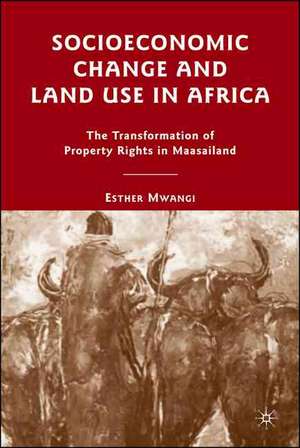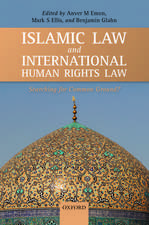Socioeconomic Change and Land Use in Africa: The Transformation of Property Rights in Maasailand
Autor E. Mwangien Limba Engleză Hardback – 25 sep 2007
Preț: 386.61 lei
Nou
Puncte Express: 580
Preț estimativ în valută:
73.98€ • 79.11$ • 61.68£
73.98€ • 79.11$ • 61.68£
Carte tipărită la comandă
Livrare economică 17 aprilie-01 mai
Preluare comenzi: 021 569.72.76
Specificații
ISBN-13: 9781403980052
ISBN-10: 1403980055
Pagini: 240
Ilustrații: XVI, 219 p.
Dimensiuni: 140 x 216 x 18 mm
Greutate: 0.38 kg
Ediția:2007
Editura: Palgrave Macmillan US
Colecția Palgrave Macmillan
Locul publicării:New York, United States
ISBN-10: 1403980055
Pagini: 240
Ilustrații: XVI, 219 p.
Dimensiuni: 140 x 216 x 18 mm
Greutate: 0.38 kg
Ediția:2007
Editura: Palgrave Macmillan US
Colecția Palgrave Macmillan
Locul publicării:New York, United States
Cuprins
The Policy Problem: Why Are Group Ranches in Maasailand Individualizing? Background to the Study Area The Evolution of Property Rights: A Theoretical Framework Methods Land Property Rights in Kajiado District: A Historical Footprint Subdividing the Group Ranch: Members' Motivations Subdividing the Group Ranch: Allocation and Distribution of Parcels The Subdivided Group Ranch: Management Strategies and Ecological Sustainability Why Group Ranches Are Individualizing: Summary and Conclusion
Recenzii
"This is a highly esteemed piece of academic work on a complicated African policy question by an African scholar with a rare combination of intimate knowledge of the ecology, culture and politics of the area."
- Audun Sandberg, Associate Professor of Social Sciences, Bodø University College, Norway"This study is informed by cutting-edge theoretical insights and fresh in-depth materials and ethnographies of institutional change, offering a definitive statement on the social transformations taking place in contemporary Maasailand."
- Mohamed Salih, Professor of Politics and Development, Institute of Social Sciences"This book addresses the puzzle of why otherwise rational Maasai seek to sub-divide group ranches, consequently losing the environmental and economic advantages of retaining collective holdings. Drawing from expertise in ecology and public policy, Mwangi shows the perverse effects that political factors can have on economic decision-making, with individualization of land - "rationally" driven by fear and defensiveness - achieving decreasing ecological viability. This volume will be interest to those in the social sciences dealing with property law, agricultural economics, and political theory."
- John Galaty, Professor of Anthropology, McGill University
"In this carefully presented analysis of property relations among the pastoral Maasai of Kenya, Esther Mwangi has added intellectual value to the growing body of literaturewhich demonstrates that privatization of land through titling or other forms of documentation, per se, is not a sufficient condition for transformation in agrarian systems in Africa - or indeed elsewhere. A combination of internal and external economic, social, cultural, and political parameters must work in tandem to create the environment necessary for desirable change. Ultimately, Mwangi affirms that it is those parameters, rather than the conversion of systems of property in land by fiat, which will determine the direction of change in society."
- H.W.O. Okoth-Ogendo, Professor of Public Law, University of Nairobi
- Audun Sandberg, Associate Professor of Social Sciences, Bodø University College, Norway"This study is informed by cutting-edge theoretical insights and fresh in-depth materials and ethnographies of institutional change, offering a definitive statement on the social transformations taking place in contemporary Maasailand."
- Mohamed Salih, Professor of Politics and Development, Institute of Social Sciences"This book addresses the puzzle of why otherwise rational Maasai seek to sub-divide group ranches, consequently losing the environmental and economic advantages of retaining collective holdings. Drawing from expertise in ecology and public policy, Mwangi shows the perverse effects that political factors can have on economic decision-making, with individualization of land - "rationally" driven by fear and defensiveness - achieving decreasing ecological viability. This volume will be interest to those in the social sciences dealing with property law, agricultural economics, and political theory."
- John Galaty, Professor of Anthropology, McGill University
"In this carefully presented analysis of property relations among the pastoral Maasai of Kenya, Esther Mwangi has added intellectual value to the growing body of literaturewhich demonstrates that privatization of land through titling or other forms of documentation, per se, is not a sufficient condition for transformation in agrarian systems in Africa - or indeed elsewhere. A combination of internal and external economic, social, cultural, and political parameters must work in tandem to create the environment necessary for desirable change. Ultimately, Mwangi affirms that it is those parameters, rather than the conversion of systems of property in land by fiat, which will determine the direction of change in society."
- H.W.O. Okoth-Ogendo, Professor of Public Law, University of Nairobi
Notă biografică
ESTHER MWANGI is a Post-Doctoral Fellow at the International Food Policy Research Institute in Washington, D.C.














